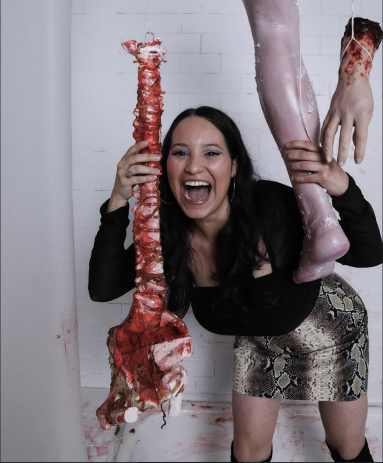Dani’s Ending in Midsommar Isn’t the Feminist Win You Think It Is
The most terrifying part of Midsommar is how many have praised it as a tale of female empowerment.
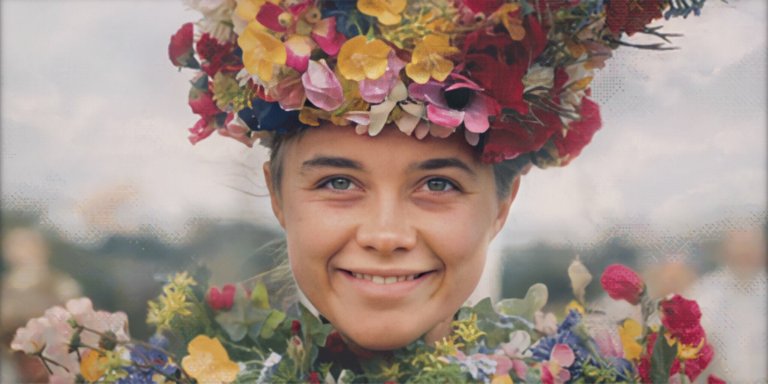
Ari Aster’s sun-soaked masterpiece proves how intricate horror can be. It’s a film that evolves with every rewatch. New details, themes, and symbolism emerge from the screen each time. The folk horror, in all its beauty and complexity, can be interpreted in a unique way with each viewing, making you rethink everything you thought of it the first, second, or third time.
For years, Midsommar was my comfort movie. Like many women who have had the misfortune of being beaten down and belittled by their own Christian (Jack Reynor) at some point in their lives, I saw myself in Dani (Florence Pugh). When she stared at him as he sat paralyzed in a chair, donned in flowers from her May Queen throne, seeing this despicable man for who he truly was for the first time, my old pain and anger resurfaced. So did pride. Her choosing him as the final sacrifice felt like Dani finally taking control. Watching Christian burning alive stuffed inside a disemboweled bear was a cathartic experience of poetic justice—that much remains true. My latest rewatch, however, came with an unsettling realization: Dani may have taken back the power Christian had over her, but in no way is she liberated.
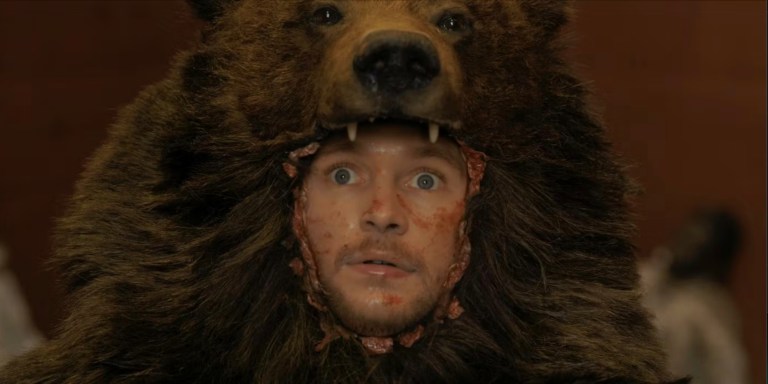
Despite being widely interpreted as a feminist film, Midsommar is not a story about female empowerment. The final shot of Dani smiling, which has been memefied and immortalized as some sort of “good for her” win, marks a tragic ending that has more to say about codependency, abuse, and the power of manipulation than it does about agency. Dani broke free from a toxic relationship, only to enter into a new one with a predatory (white supremacist) cult. Her fairy tale ending is an illusory one. The Hårga gave her the sense of belonging and companionship she was so starved for, but it came at a high cost.
Dani’s Struggles: A Toxic Relationship, Grief, Trauma, and Mental Illness
From the opening scene an imbalanced power dynamic is established between Dani and Christian. Christian has checked out long ago, but hasn’t ended things out of fear he might “regret it later,” for other self-serving reasons, and because of his cowardice. Aware of his growing distance, Dani blames herself for relying on him “too much” when it comes to her struggles, namely her concerns about her sister’s mental health. As her friend reminds her over the phone, it’s Christian’s responsibility as her partner to be supportive, and Dani doing all the “leaning” is a sign that she’s the only one who has made herself vulnerable in the relationship.
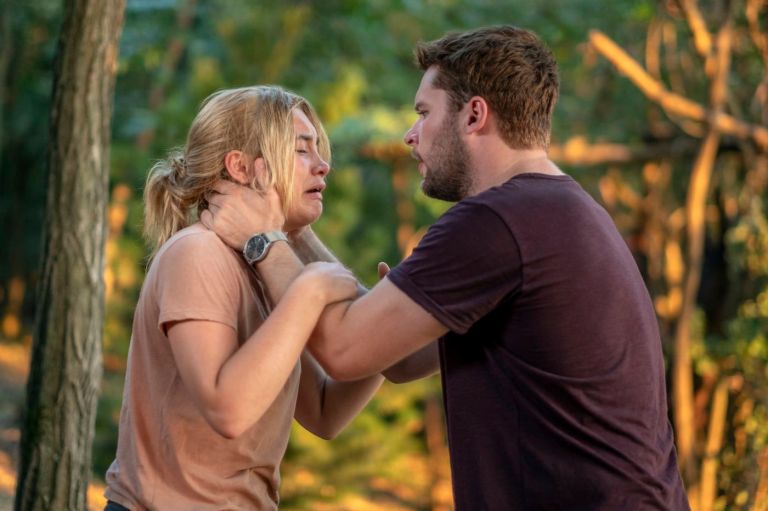
Dani’s worst fears—the very same ones Chrisian minimized and dismissed—come true when her sister Terri (Klaudia Csányi) enacts the murder-suicide of her entire family. Christian, perhaps well-intentioned, stays with her, failing to realize that it’s not him she needs, but real emotional support, which he fails to provide at every turn. Instead, he becomes the embodiment of gaslighting, manipulation, and toxic masculinity. Dani’s the one always apologizing to and for her boyfriend when he’s the one in the wrong. It’s she who puts all the emotional labor into the relationship, even when she’s so consumed by grief. The only way to keep the peace is for her to hide her needs and internalize her feelings. Because she’s so desperate for family and belonging, she clings to her codependent relationship with Christian, even as he disregards her attempts to connect, prioritizes his desires over her well-being, and teaches her to second-guess herself.
Dani is implied to have struggled with mental illness before her horrific loss. Afterwards, she suffers from a deeper psychological struggle marked by debilitating depression, intensifying panic attacks, moments of dissociation, and emotional breakdowns. Christian treats her severe mental health concerns as an inconvenience to his existence. Dani has coping skills—she goes to therapy, takes medication, forces herself out of bed, makes efforts to socialize, and frequently practices breathing work to ground herself—but she’s fighting her grief and trauma alone. She lacks the support and empathy essential to any healing process. Christian, the one person who should provide her those things, uses her pain as an excuse to maintain his distance. Throughout the film, Dani is always left alone in her times of need.
It’s this emotional vulnerability that makes her a prime target for the Hårga.
The Hårga’s Indoctrination Tactics
Midsommar is such an immaculate portrayal of the cult indoctrination process that audiences are happy for Dani by the end of the film, completely missing the point. The Hårga’s sophisticated tactics resemble those of real-life cults who prey on people at their most vulnerable. Dani, grief-stricken and traumatized, is alone in the world, with nowhere left to call home and no real support. Instead of being those things for her, her boyfriend makes her feel more abandoned and exacerbates her pain. The Hårga take advantage of her isolation, sensing in her a desperate need for empathy and belonging. In order to achieve their aims, they ply her with hallucinogenic drugs to warp her perception, mentally drain her, isolate her, drive her over the edge, and love bomb her. Dani falls right into their arms, but so do we. Thanks to Aster’s meticulous crafting of the narrative as a fairy tale, viewers are brainwashed alongside her.
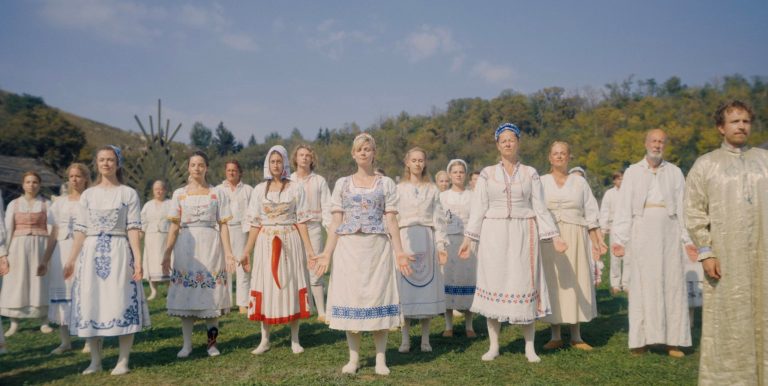
Calm, soft-spoken, and charismatic Pelle is one of the biggest forces behind our seduction. He’s the only one in Christian’s group of friends to ever show Dani warmth and compassion. When she announces she’s going to Sweden, no one expresses welcome and excitement but him. In stark contrast to Christian, Pelle is attentive to Dani’s emotions and needs. Whereas her neglectful boyfriend forgets her birthday, Pelle gifts her a thoughtful hand-drawn portrait. With Christian, Dani has to repress and isolate. Pelle encourages her to open up. Christian is evasive. Pelle makes attempts at connection. He wants Dani to feel seen.
After witnessing the violent Ättestupa ritualized suicide, Dani’s triggered and distraught, and Christian encourages her to take time alone. It’s Pelle who goes after her to console her. He asks her to sit next to him to talk it out, drawing a parallel to an earlier scene where Dani pleads for Christian to do the same only to be refused. Pelle tells her about how he, too, lost his parents, but that it was easier for him, because unlike her, he had a community to lean on. In that moment, he’s offering her a sense of shared trauma and the possibility of a new family who will embrace her. He then asks that one unforgettable, weighty question: “Do you feel held by him? Does he feel like home to you?” As Dani’s only source of validation and comfort, he appears as a knight in shining armor. In reality, he’s exploiting Dani’s loneliness and the viewer’s empathy, subtly manipulating both into thinking the Hårga can offer Dani the unconditional love she needs. Pelle has been puppeteering the strings all along to bring Dani into the commune as his chosen partner and assimilate her into the Hårga.
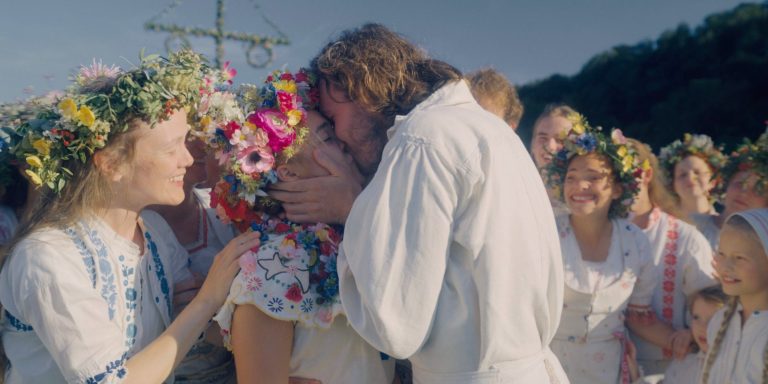
The most sinister and insidious act of grooming comes after Dani witnesses a drugged Christian engaged in a sex ritual. Both the mating and her discovery have been staged by the Hårga. The director’s cut features an extended meeting between Christian and Siv (Gunnel Fred), in which she entices him into accepting the sexual proposition between him and Maja (Isabelle Grill) by offering a unique insight for his thesis, knowing he has procrastinated and desperately needs it. She’s also aware that he has no qualms about being unfaithful to his girlfriend or doing anything that may bring about the demise of their relationship. Severing the tie between him and Dani is essential to reeling her in. They prey on his weaknesses to achieve that, and it works.
The women of the commune surround Dani as she dissolves into a frenzied panic attack. They sob and scream in agony with her, making her feel like they’re taking on her heartbreak as their own and helping her release her pain. For once, Dani is allowed to be vulnerable without being shamed or having to apologize for it. It seems as though she finally has someone with whom she can share her emotional burden—someone who will hold her in both a metaphorical and literal sense. It’s a scene that has been grossly misinterpreted as beautiful for simply showing a group of women huddled and feeling together. This is not an empathetic moment of female solidarity, but a cult’s heavily choreographed act of manipulation, exploitation, and love bombing. It’s all theatrics. By crying with Dani and making her believe they’re all in her grief together, they’re extinguishing her individuality. Sure, they’re helping Dani finally process her feelings and making her feel understood and less alone, but this is what cults do to lure their victims. Dani reaches catharsis, but loses herself in the process.
Dani’s False Empowerment
The final step in Dani’s indoctrination comes when the Hårga publicly present the May Queen with a choice—her selfish boyfriend, whom she has just witnessed betray her, or a member of the commune as the final sacrifice. By this point, Dani is completely broken down and hollowed out. She’s engulfed in her flower dress, disappearing into it the same way she did into her grief and toxic relationship. A catatonic Dani looks over at Christian, and her pain and rage begin bubbling inside her. She has chosen.
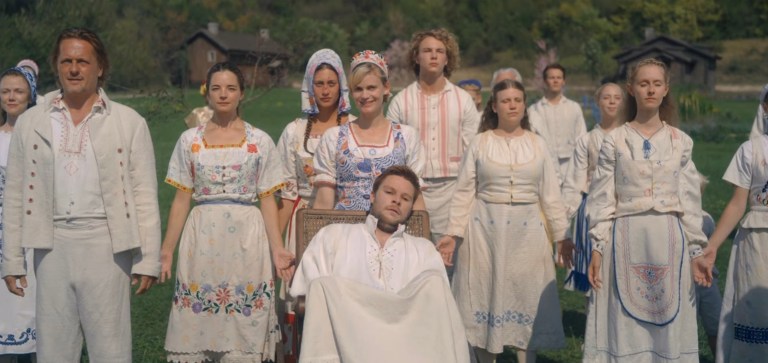
The true horror of the film stems from the fact that Dani has very little agency, if any at all, despite what she and the audience might feel. The temple burning is read by many as emblematic of Dani’s liberation and rebirth, but truly, it represents her freedom going up in flames. Dani breaks free from a toxic, emotionally abusive, codependent relationship, only to enter into another one with a manipulative cult that has preyed on her at her most fragile, groomed her, isolated her, exploited her, and given her a false sense of safety and family. With her decision, which they very much orchestrated, the Hårga have ensured she has nowhere to go. Joining a white supremacist, eugenicist, ableist, fascistic murder cult is all Dani has left. There’s no real agency in that. Dani will live the rest of her life bound by their regulations and customs, and eventually she’ll be sacrificed, too.
Because we’ve spent the whole film viscerally experiencing Dani’s journey, her smile feels like a relief, and we can’t help but view the Hårga as the home she has longed for. We’re tricked into believing that finally her suffering has ended and that she has taken control of her own narrative. In truth, the protagonist has lost all semblance of control. Dani’s new family has effectively cut her off from both society and reality. Her mental state was already frayed before she set foot in Hälsingland. Through careful planning, the Hårga made certain she fully unraveled. Dani isn’t smiling because she got her happy ending, but because she’s experiencing a psychotic break. In the screenplay, Aster himself describes the final moments as follows: “A SMILE finally breaks onto Dani’s face. She has surrendered to a joy known only by the insane. She has lost herself completely, and she is finally free. It is horrible and it is beautiful.”
The White Feminism of Midsommar
Dani is a woman who is white and lacks intersectionality, and who only survives because of these traits. The Hårga would not have chosen her to join their ranks had it not been because of her whiteness. Aster himself has confirmed the Hårga’s racism on different occasions. This is a group of people who are so obsessed with keeping their blood “pure” that they carefully monitor mating. When they look outside of their community for “new blood,” they exclusively seek white candidates. Christian and Mark (Will Poulter) were used as breeders before becoming offerings, while all three characters of color were only invited as sacrifices. Connie (Ellora Torchia), the only WOC in the film, never stood a chance of becoming May Queen.
Through a white feminist lens, it’s easy to view Midsommar as a tale of female empowerment. By focusing on Dani’s plight alone, audiences are ignoring the blatant racism and white supremacist ideals of the Hårga. To praise Midsommar as a feminist film is to fail to recognize that white women are complicit in systems of power and oppression. Dani benefits from the exploitation, exclusion, and violence against members of marginalized groups. The cost of her “empowerment” is the brutalization of the Hårga’s other victims. Others must be sacrificed for her to triumph.
It’s not feminism just because a (white) woman has achieved “victory” over the man who has wronged her. Dani has become part of an authoritarian system rooted in racial power dynamics that harms others in the name of tradition. Her “newfound power” comes at the expense of her autonomy and through embracing white supremacy. There’s nothing truly feminist about her “happy ending.”
Conclusion: The Misinterpretation of Dani’s Smile as a Feminist Symbol
Dani’s close-up at the end has been hailed as a symbol of power and reclamation, when in fact, it’s a haunting image of a subjugated woman handing herself over to a dangerous force. She may have broken free from her unhealthy relationship with Christian, but she has replaced one form of manipulation and codependency with another. Dani hasn’t truly worked through any of her trauma, or healed, or become self-determined. She has been further traumatized and abused into submission, and she has lost her ability to cope with reality.

Pelle brought Dani as “new blood.” It was the Hårga’s plan all along to indoctrinate Dani into their cult. This is explicitly shown when the group arrives at the commune. Odd (Mats Bolmgren) greets Josh (William Jackson Harper), Mark, and Christian casually and shakes their hands. When greeting Dani, he embraces her in a hug and says to her, “Welcome home.” The honor bestowed upon her as May Queen is deliberate and calculated to make her feel special and control her. It’s an illusion of power, much like her decision in naming Christian the final sacrificial offering. Her reclamation of agency is short-lived and not entirely hers.
The ending is certainly cathartic, but it’s no win for feminism. Our protagonist’s sanity has slipped. She has fallen into the grip of a manipulative white supremacist cult with distorted ideologies. She hasn’t taken control of her life by joining them, but given it up entirely. In order to cling to the sense of belonging they have offered her, she’ll be willing to do anything the Hårga want when the time comes. “Take from the Yew tree, feel no pain,” the elder tells UIf (Henrik Norlén) and Ingemar (Hampus Hallberg), the commune’s volunteer sacrifices, before they die a clearly excruciating death in the fire. Dani’s liberation is nothing more than a lie, too. There’s nothing empowering about her smile.
Further reading:
